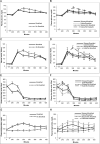Usual breakfast eating habits affect response to breakfast skipping in overweight women
- PMID: 25755093
- PMCID: PMC4380779
- DOI: 10.1002/oby.21049
Usual breakfast eating habits affect response to breakfast skipping in overweight women
Abstract
Objective: This randomized, cross-over trial was designed to investigate the metabolic and appetitive responses to skipping breakfast in overweight women who were habitual breakfast Eaters or Skippers.
Methods: Nine Eaters and nine Skippers were studied on two separate days during which subjects ate breakfast (B) or had no breakfast (NB), followed by a standard lunch meal 4 h later. Blood sampling for hormones and metabolites was performed after lunch, and appetite was rated throughout the day.
Results: Interactions between day and habitual breakfast pattern were seen for area under the curve (AUC) for insulin and free fatty acids (FFA). Both insulin (P = 0.020) and FFA (P = 0.023) AUC were higher on the NB day for Eaters but similar on both days for Skippers. Eaters had higher pre lunch hunger AUC on the NB day (P = 0.015) as well as lower pre lunch satiety AUC under both conditions (P = 0.019).
Conclusions: Overall, this study showed that the adverse effects of skipping breakfast (higher insulin and FFA responses to lunch, increased hunger, and decreased satiety) were found primarily in habitual breakfast eaters. This suggests that meal skipping may have enhanced effects in habitual Eaters due to entrainment of metabolic and appetitive regulatory systems.
© 2015 The Obesity Society.
Figures



References
-
- Flegal KM, Carroll MD, Kit BK, Ogden CL. Prevalence of obesity and trends in the distribution of body mass index among US adults, 1999-2010. JAMA : the journal of the American Medical Association. 2012;307:491–497. - PubMed
-
- Cho S, Dietrich M, Brown CJ, Clark CA, Block G. The effect of breakfast type on total daily energy intake and body mass index: results from the Third National Health and Nutrition Examination Survey (NHANES III). Journal of the American College of Nutrition. 2003;22:296–302. - PubMed
-
- Albertson AM, Anderson GH, Crockett SJ, Goebel MT. Ready-to-eat cereal consumption: its relationship with BMI and nutrient intake of children aged 4 to 12 years. Journal of the American Dietetic Association. 2003;103:1613–1619. - PubMed
-
- Berkey CS, Rockett HR, Gillman MW, Field AE, Colditz GA. Longitudinal study of skipping breakfast and weight change in adolescents. Int J Obes Relat Metab Disord. 2003;27:1258–1266. - PubMed
-
- Song WO, Chun OK, Obayashi S, Cho S, Chung CE. Is consumption of breakfast associated with body mass index in US adults? Journal of the American Dietetic Association. 2005;105:1373–1382. - PubMed
Publication types
MeSH terms
Substances
Grants and funding
LinkOut - more resources
Full Text Sources
Other Literature Sources
Medical
Research Materials

